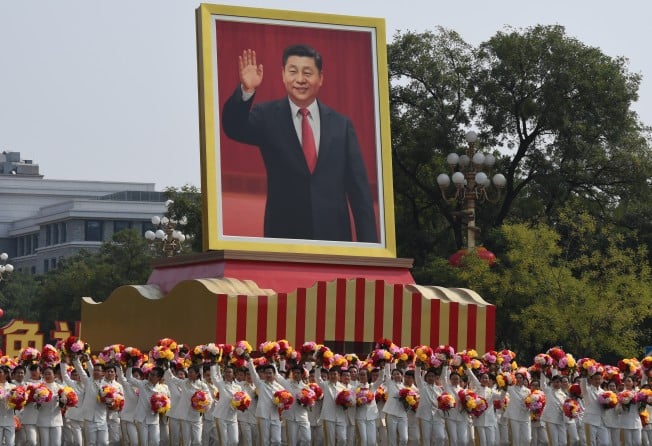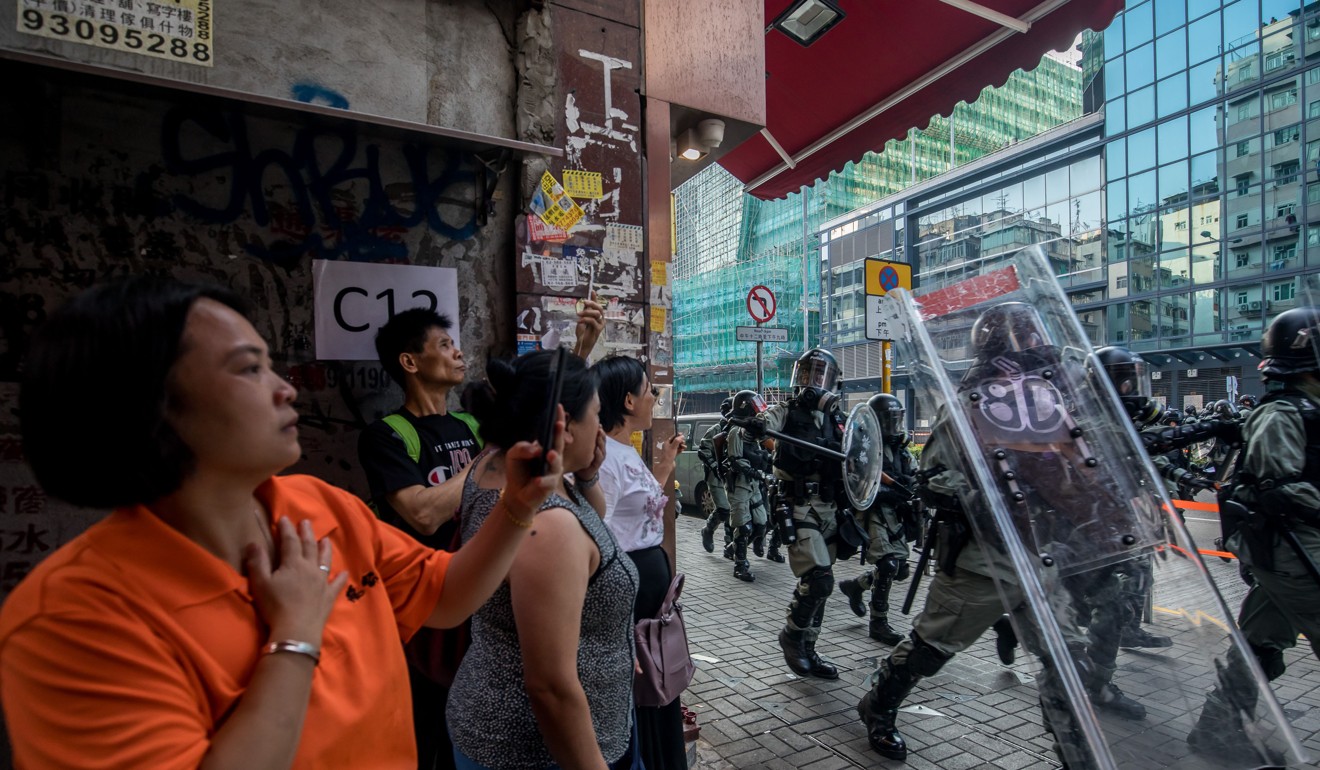Congratulations to President Xi and the Chinese people on the 70th Anniversary of the People’s Republic of China!
— Donald J. Trump (@realDonaldTrump) October 1, 2019
Trump’s National Day praise of China shows rift with Republicans who decry Hong Kong protester shooting
- While the US president tweets his congratulations to Xi Jinping, Republican lawmakers issue anti-Beijing comments
- A State Department official calls Trump’s message ‘absolutely disgusting’

China’s National Day festivities and the police shooting of an anti-government protester in Hong Kong revealed the rift Tuesday between US President Donald Trump and his Republican Party when it comes to sentiments towards Beijing.
The juxtaposition of China’s celebration of the 70th anniversary of the founding of the People’s Republic of China with reports that an 18-year-old protester had been shot in the chest by Hong Kong police drew overwhelmingly sympathetic reactions in Washington towards the wounded youth.
While Trump tweeted his “congratulations to President Xi [Jinping] and the Chinese people on the 70th Anniversary of the People’s Republic of China!”, Republican lawmakers discussing China on Tuesday had nothing but negative comments about the country.
A Twitter post by the Republican wing of the House Foreign Affairs Committee summed up what many in the party had to say.
“A 12th grader was shot in the chest at point-blank range today in Hong Kong while Xi Jinping paraded weapons through Tiananmen Square (30 years after massacre). Both are grave reminders how far the Chinese Communist Party will go to achieve total control,” the group, representing 21 lawmakers, said.
Anti-government protests in Hong Kong, sparked by a now-abandoned extradition bill, have become more violent in the four months since they started, culminating most recently in an effort by many of the demonstrators to tarnish the National Day celebrations the Chinese government had intended to be a high point of national pride.
Hong Kong is a special administrative region of China, which was guaranteed a high degree of autonomy for 50 years after sovereignty over the city was transferred back to China from Britain in 1997.
Other US Republicans weighed in on the news from Hong Kong and Beijing, laying blame on Beijing not only for the unrest in the former British colony but also for the repression of other groups in the Greater China region.

“It is darkly fitting that on the 70th anniversary of the PRC, its agents would be reduced to using force against protesters in Hong Kong who seek to preserve basic personal freedoms,” said Senate Majority Leader Mitch McConnell, Republican of Kentucky. “The CCP has always squashed dissent with force.”
“From the modern gulags used to incarcerate Xinjiang’s Uygurs, to the high-tech firewalls and censorship that control the flow of information, to the state’s extensive technical surveillance, to all of the Communist Party’s other tools of social and political control, Xi Jinping’s China looks disturbingly like a modern version of Maoist China,” according to the statement released by McConnell’s office.
Other Republicans used a broad brush to connect the violence in Hong Kong and other issues to Beijing.
“The US stands with the foremost victims of the Chinese Communist Party: Chinese citizens themselves,” Representative Liz Cheney of Wyoming, chairwoman of the House Republican Conference, said in a statement.
“It is for their future, as well as that of their fellow victims in Xinjiang, in Hong Kong, Taiwan and beyond, that we rededicate ourselves to ensuring that the Chinese Communist Party is left on the ash heap of history,” Cheney said.
Cheney’s comments run counter to those Trump has made, lauding the accomplishments of Xi, the party’s leader.
While the US president has often blasted China for what he and many lawmakers of both major parties call unfair trading practices – and started a trade war last year – Trump has called Xi “brilliant” and “great”.
A State Department official called Trump’s congratulatory message to Xi on the day a protester was shot by police “absolutely disgusting”.
“As president of the United States he has a responsibility to speak up for democracy, human rights, rule of law and freedom,” the official said on condition of anonymity to be able to speak frankly.
“Why he misses every opportunity to do so is beyond me.”
Many Republicans had been on the side of Hong Kong’s largely leaderless anti-government movement even before the shooting made global headlines.
Just a day earlier, for example, Republican Senator Rick Scott of Florida expressed his support in a video clip about his recent trip to Hong Kong, where, according to a statement released by his office, he met with pro-democracy figures as well as the city’s Chief Executive Carrie Lam Cheng Yuet-ngor and local business leaders.
Speaking in front of a “Lennon Wall”, where Hongkongers post thousands of notes sympathising with the pro-democracy movement, Scott says the locals are “fighting for their freedom, fighting for their liberty, fighting for their human dignity. They’re fighting against communist China”.
Marco Rubio, Florida’s other senator, also a Republican, sponsored the Hong Kong Human Rights and Democracy Act of 2019, which has strong bipartisan support and was approved last week by the Senate Foreign Relations Committee.
The bill would authorise the US State Department to sanction individuals responsible for any action that violates Hong Kong’s autonomy.
The legislation, and a similar bill of the same name in the House of Representatives, is expected to go to the floors of both chambers for a vote by mid-October.
Additional reporting by Owen Churchill